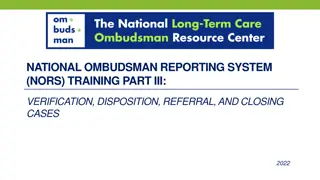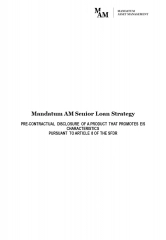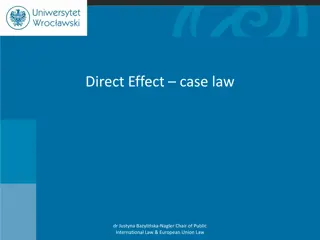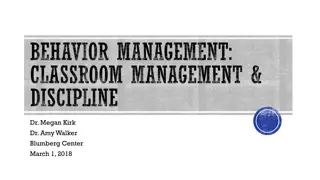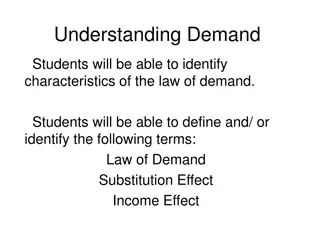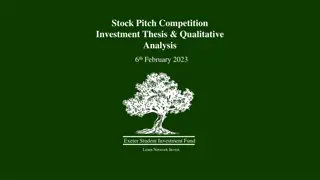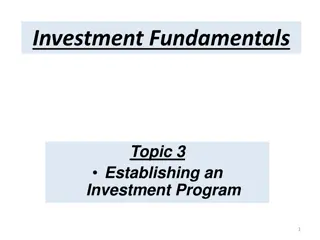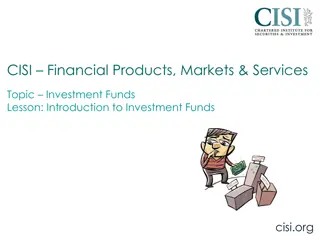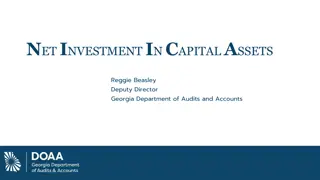Understanding the Disposition Effect in Investment Behavior
Investors often exhibit the disposition effect by selling winning stocks too early and holding onto losing stocks for too long due to a desire to avoid regret and seek pride. This behavior can lead to missed opportunities for higher returns and negative tax consequences. Studies show that awareness of tax implications can help reduce the disposition effect, influencing investor behavior.
Download Presentation

Please find below an Image/Link to download the presentation.
The content on the website is provided AS IS for your information and personal use only. It may not be sold, licensed, or shared on other websites without obtaining consent from the author. Download presentation by click this link. If you encounter any issues during the download, it is possible that the publisher has removed the file from their server.
E N D
Presentation Transcript
Chapter 3 Pride and Regret
Avoiding Regret and Seeking Pride People avoid actions that create regret People seek actions that create pride Fearing regret and seeking pride causes investors to be pre-disposed to selling winners too early and riding losers too long. This is called the disposition effect. 2
Trades in 10,000 brokerage accounts from a nationwide discount brokerage show when a stock is sold: Investors are 50% more likely to sell a winner than a loser The winner stock sold ends up beating the market over the next year by an average 2.35% The loser stocks that the investors kept under- performed the market by 1.06% 3 Terrance Odean, Are Investors Reluctant to Realize Their Loses? Journal of Finance 53(1998): 1775-1798.
Selling winners instead of losers also has negative tax consequence. Stock A rose from $833 to $1,000 (winner) Stock B declined from $1,250 to $1,000 (loser) 4
More Evidence Volume after price gains and losses Prediction is that stocks will have less volume after price losses and more volume after price increases 5 Stephen P. Ferris, Robert A. Haugen, and Anil K. Makhija, Predicting Contemporary Volume with Historic Volume at Differential Price Levels: Evidence Supporting the Disposition Effect, Journal of Finance 43(1987): 677 697.
Return of stocks and holding period Prediction is that stocks sold quickly have high returns while stocks held longer have lower returns. Gary G. Schlarbaum, Wilbur G. Lewellen, and Ronald C. Lease, Realized Returns on Common Stock Investments: The Experience of Individual Investors, Journal of Business 51(1978): 299 325. 6
Taxes Can Reduce the Disposition Effect An experiment in which tax loss selling is prominent to one group but not the other The treatment group (high tax salience group) received a notice indicating the tax implication for each trade The high tax salience group reduced the disposition effect by 22% to 47% compared to the control group Both sides of the disposition effect where affected: high tax salience group held winners longer and sold losers sooner 7 William J. Bazley, Jordan Moore, and Melina Murren Vosse, Taxing the Disposition Effect: The Impact of Tax Awareness on Investor Behavior, Journal of Financial and Quantitative Analysis (2021) forthcoming.
Loss Aversion Found in Stocks: Finland Israel China Non-stocks Futures markets (e.g., bond, currency, stock index) Employee stock options Exchange traded stock index options Real estate But not in mutual fund shares. Why? Sell loser funds and hold winner funds There may be a lower feeling of regret when you can blame others, like a MF manager or an advisor. 8
Blame Others to Reduce the Pain of Regret Selecting investment assets entails various levels of delegation: Low: buying stocks at a discount brokerage Medium: buying index mutual funds High: Financial advisor, actively managed mutual funds Low Delegation Disposition Effect Trading High Delegation Reverse Disposition Effect 9 Tom Chang, David Solomon, Mark Westerfield, 2016, Looking for Someone to Blame: Delegation, Cognitive Dissonance, and the Disposition Effect, Journal of Finance, 71, 267-302.
Impact of Loss Aversion When Selling Adaptations when selling at a loss Sellers normally list a property at a price that is an average of 12% higher than its market value. When selling at a loss, they list at 35% over value! This leads to a much longer time on the market and price revisions. 10 David Genesove and Christopher Meyer, Loss Aversion and Seller Behavior: Evidence from the Housing Market, Quarterly Journal of Economics 116(2001): 1233 1260.
Avoiding the Disposition Effect Cut your losses and let your winners run. You have to love losses and hate gains. Cluster the selling of losers into one day Take all the pain of regret at once over a short time period Separate selling of winners over many days Prolong the feeling of pride In some cases, match the selling of winners and losers at the same time. 11 Sonya Seongyeon Lim, 2006, Do Investors Integrate Losses and Segregate Gains? Mental Accounting and Investor Trading Decisions Journal of Business, 79, 2539-2573.
Your Decision or Act of God? The feeling of regret is strong if it is clear that you made a bad choice You pick one company and its price declines while the other firms in the industry rise The feeling of regret is weak if it is clear that the ramifications of the choice were out of your control Your stock declines in a general marker decline 12
Investor Reaction to News Firm-specific news Good news about a firm induces investors to sell (selling winners) Bad news about a firm does not induce investors to sell (holding losers) Macroeconomic news News about the economy does not induce individual investor trading 13 John R. Nofsinger, The Impact of Public Information on Investors, Journal of Banking and Finance 25(2001): 1339 1366.
Blackjack Rules The dealer hands you two cards, facing up. The dealer also receives two cards, but you can only see one. To win, your cards must total more than the dealer s. You can request more cards to increase your total, but if your total exceeds 21, you lose immediately. 14
Lets Play A Game 7 7 Hit or 7 7 Stand? 9 9 Your Hand Dealer 15
Blackjack Experts say you should take another card (hit) Most players do not take a card (stand) Why? 16
Regret Aversion Taking action and losing feels worse than doing nothing and losing Although the outcome is the same, regret plays a larger role post-action 17
Consider this Example You have been selecting the same lottery ticket numbers every week for months. Not surprisingly, you have not won. A friend suggests a different set of numbers. Do you change numbers? 18
Lottery Example Continued Odds of winning are the same, new numbers or old numbers However, the feeling of regret is different. Regret of Omission Regret that you did not do something I should have bought that stock Regret of Commission Regret that you did do something I should not have bought the stock Regret of commission is stronger Most people don t change numbers 19
Reference Points What is a profit or a loss? To determine a profit or loss, you need to compare the current price to a reference point. Investors also fixate (anchor) on specific stock prices (Reference Points) Purchase price Highest price Highest recent price Most recent price 20
Reference Points - continued Example You purchased a stock for $50 per share At the end of the first year it traded for $60 Now it trades for $55 Do you consider this a winner or a loser? Do you have a profit of $5 or a lose of $5? The reference point you use can dramatically impact your view and thus your actions! 21
Once Burned, Twice Shy The pain of regret and the joy of being right and making profits combine to cause investors to repurchase some stocks that they previously owned. Michal Ann Strahilevitz, Terrance Odean, and Brad M. Barber, Once Burned, Twice Shy: How Na ve Learning, Counterfactuals, and Regret Affect the Repurchase of Stocks Previously Sold, Journal of Marking Research 48(2011), S102 S120 22
Repurchasing stock previously sold is a fairly pervasive behavior About 40 percent of investing households making at least one repurchase Most likely to occur if it was the most recent stock sold People tend to more easily recall the most recent events. Thus, the most recent stock sale is the most salient and on the investor s mind This behavior is sub-optimal and that more sophisticated investors are less likely to engage in it John R. Nofsinger and Abhishek Varma, Availability, Recency, and Sophistication in the Repurchasing Behavior of Retail Investors, Journal of Banking & Finance 37 (2013): 2572 2585. 23
Summary Avoiding the emotional pain of regret causes investors to sell winners too soon and hold on to losers too long. This causes a loss of wealth from taxes and a bias toward holding stocks that perform poorly. The disposition effect can be seen in many markets around the world. Reference points are important for a person s attitude about current investment positions Investors repurchase stocks sold as winners, whose price subsequently falls. 24



